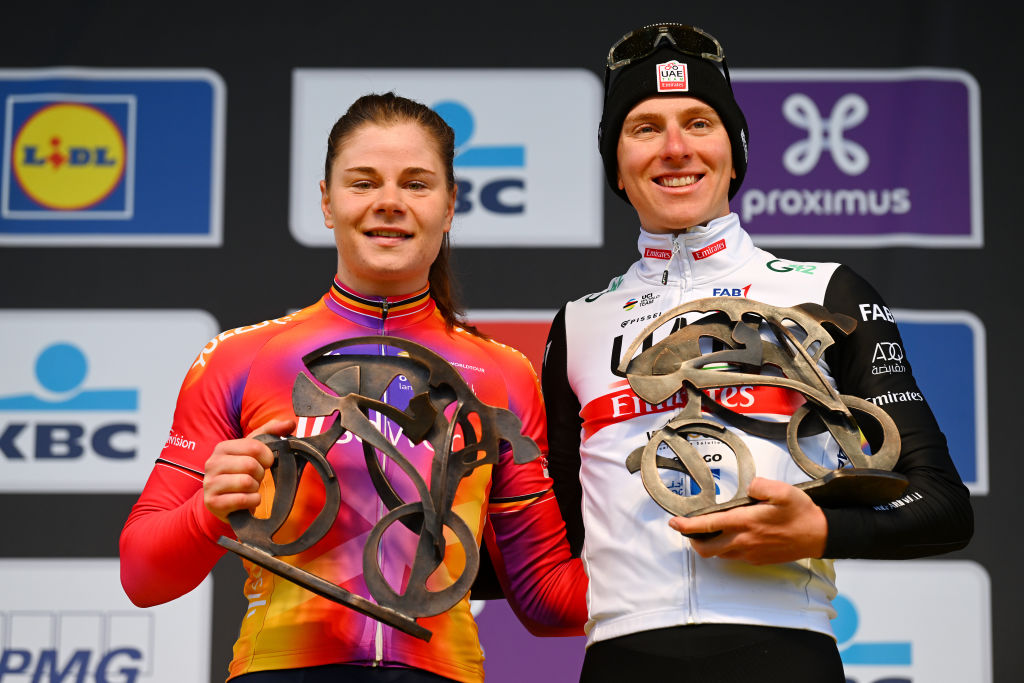
The Tour of Flanders never disappoints. Two stunning solo victories, for Tadej Pogačar and Lotte Kopecky, placed both riders in the history books, as Pogačar became the first rider to win both the Tour de France and the Tour of Flanders since 1975, and Kopecky became the first to repeat a Tour of Flanders win since Mirjam Melchers in 2005-2006.
Pogačar’s victory, ahead of consummate Classics racers like Mathieu van der Poel and Wout van Aert, was one that arguably elevates the Slovenian into the ranks of the all-time stars of the sport. Victories in Liège-Bastogne-Liège or Il Lombardia are not so infrequent for riders who have made a name for themselves in the Grand Tours. Flanders, though, is another story, and as Eddy Merckx - the previous rider to capture both Flanders and the Tour, way back in 1975, observed afterwards, “Pogačar can win anything.”
Kopecky had an equally tough ask, looking for a repeat victory to add to her Omloop Het Nieuwsblad and Nokere Koerse successes of earlier this spring, and with all the extra pressure that being defending champion implies. The loss of her brother earlier this year gives all her success this year an added dimension that only increases fans’ and media's respect and sympathy alike.
But any Monument is much more than its top champion, and Flanders also witnessed an excellent performance even in defeat from star Mathieu van der Poel, a gutsy third place from Mads Pedersen and some notable debuts from Americans Neilson Powless and Matteo Jorgenson.
In the women’s race, the continuing domination of SD Worx, now onto their ninth Classic victory this spring and the return to battle after COVID-19 for Elisa Longo Borghini are also major interest points. Our reporters on the ground take a look at what these multiples narratives all meant.
Mathieu van der Poel just rode his best Tour of Flanders
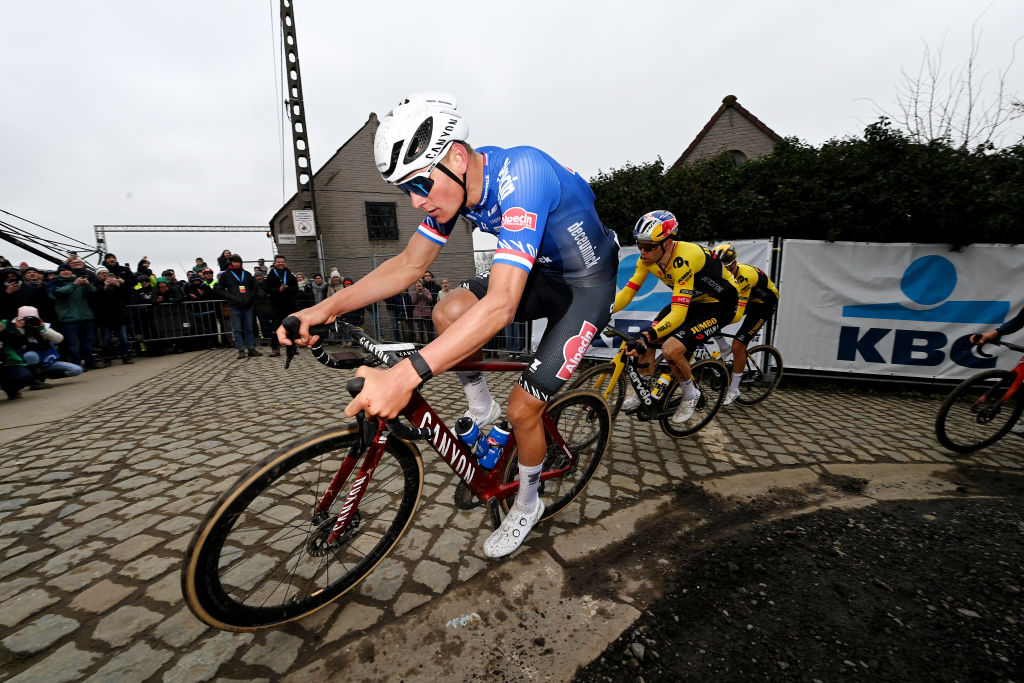
It’s pointless to wonder how much more Mathieu van der Poel might already have won had his career not overlapped with Wout van Aert. Like Messi and Ronaldo or Magic and Bird, the eternal rivalry has driven each man to heights he would likely never have reached alone.
Van der Poel may, however, rue the day that Tadej Pogačar developed a taste for the cobbles and hills of the Flemish Ardennes. Pogačar’s startling solo victory eclipsed everything else on Sunday, but the quality of Van der Poel’s showing should not be overlooked. On Sunday, he simply had the misfortune to be forced to play Salieri to Pogačar’s Mozart.
It damns Van der Poel with faint praise to say he was simply the best of the rest here. He got caught out in an early split, but he scarcely put a foot wrong thereafter. His cutting acceleration on the Kruisberg condemned Van Aert and changed the tenor of this race, and even though he couldn’t hold Pogacar on the Kwaremont, he still reached Oudenaarde almost a minute clear of an elite group of chasers.
Without Pogačar, this could have been a Van der Poel exhibition for the ages, and he would have equalled the record for Ronde victories in the process, all at just 28 years of age.
In his five Tour of Flanders appearances to date, Van der Poel’s sequence of results now reads 4th, 1st, 2nd, 1st, and 2nd. The victories of 2020 and 2022 are the emotional highs, of course, but from a purely athletic standpoint, Sunday’s second-place finish was almost certainly his best Tour of Flanders performance – and probably one of the best displays of his entire career. Such are the pitfalls of racing in the Pogačar era.
Kopecky unstoppable
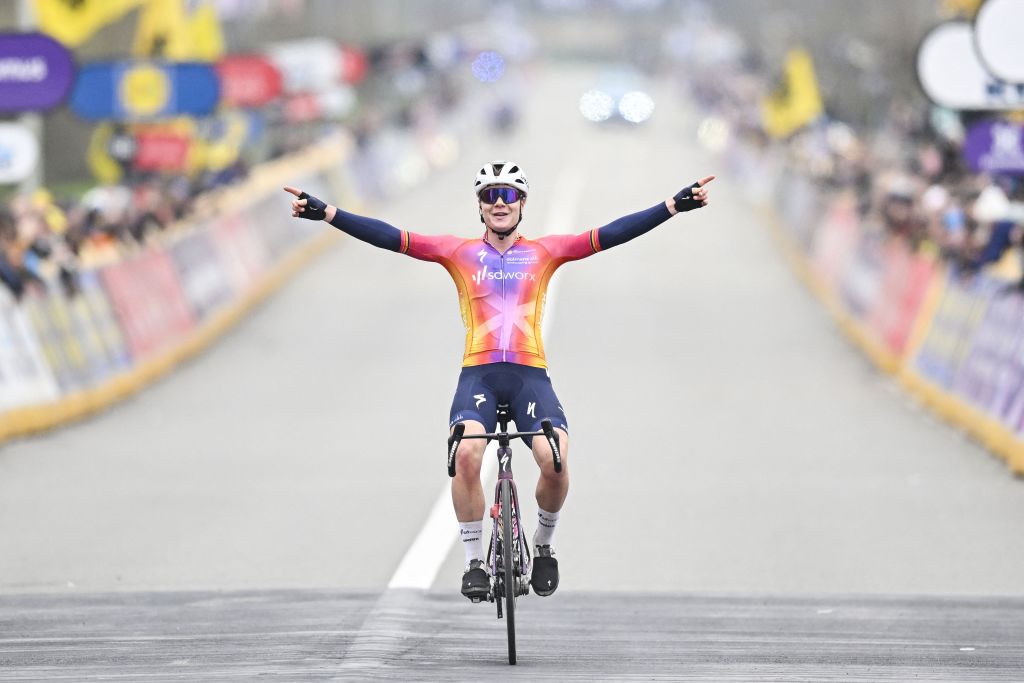
The big pre-race question was - can anyone beat Lotte Kopecky at the Tour of Flanders? And the answer was a resounding no.
Kopecky is on a role during her spring campaign delivering two wins for SD Worx at Omloop Het Nieuwsblad and Nokere Koerse while also finishing second behind teammate Demi Vollering at Strade Bianche after a close two-up sprint - all in a run-up to her targeted cobbled classics Tour of Flanders and then into Paris-Roubaix on April 8.
The most iconic race of the season on Belgian soil, local fans were out to watch the race, first treated to a riveting showdown in the men's race won by Tadej Pogačar, which was then followed up by Kopecky's dominant performance as the only Belgium rider to stand on the podium at this year's Tour of Flanders.
And while Grace Verbeke was the first Belgian rider to win the women's Tour of Flanders in 2010, Kopecky's victory last year also had a historical factor as she was one of the few riders to have won while wearing the colours of the Belgian National Champion, a short list that also includes Philippe Gilbert in 2017 and Stijn Devolder in 2008.
A remarkable performance this year saw Kopecky ride away from the decisive breakaway, distancing her last rival, Silvia Persico (UAE Team ADQ), on the Oude Kwaremont and soloing to the win by a 36-second margin. It all bodes well for her upcoming ambitions at Paris-Roubaix.
SD Worx, once again, played their number to perfection to go 1-2, with Vollering securing second place at the Tour of Flanders. Kopecky heads into Paris-Roubaix as the favourite, but she is aware that luck, rather than numbers, could play a bigger factor in the Hell of the North next weekend.
"I dream of winning Paris-Roubaix, but it's so hard to target this race because there's so much luck involved. I don't dare to say 'I want to win Paris-Roubaix".
Pogačar can win any race he wants to win
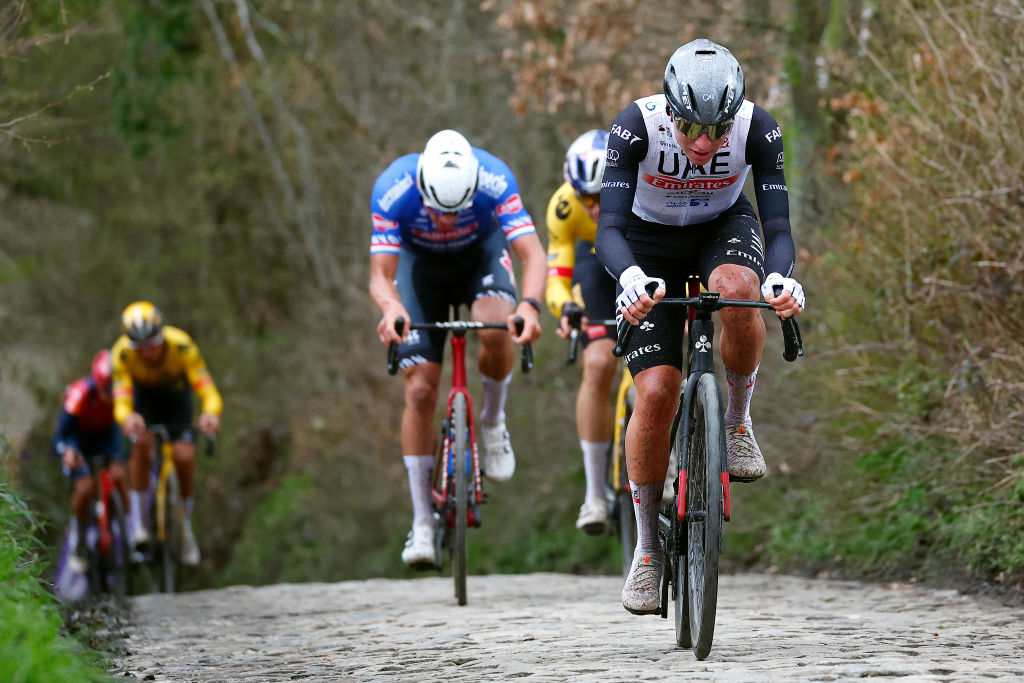
Even before Tadej Pogačar crossed the line in Oudenaarde on Sunday, talk had turned to whether – or perhaps even when – the Slovenian would complete a full set of five Monuments. It’s an entertaining parlour game, of course, but it’s a debate that feels almost moot.
For one thing, the Monument term is a recent invention. UCI president Hein Verbruggen, for instance, told Le Monde in the Spring of 1989 that the new World Cup would safeguard “the five or six” Monuments of cycling. For most of the 20th century, classics were simply classics (or occasionally semi-classics), their prestige (and prize money) rising and falling from decade to decade.
Fausto Coppi, for instance, is third on the all-time list of Monument winners, with nine, but he never raced the Tour of Flanders or Liège-Bastogne-Liège. He did, however, win Flèche Wallonne in 1950 and he was demoted to second at the 1948 Omloop for an illegal wheel change.
In other words, there are limits to any attempt to rank Pogačar’s current achievements objectively in the context of cycling history. Rather than fret over whether he ticks the same boxes Eddy Merckx, Rik Van Looy and Roger De Vlaeminck (unwittingly?) ticked in the Monuments of the 1960s and 1970s, it’s perhaps best to focus on Pogačar’s standing in the here and now.
In an era of remarkably versatile talents, Pogačar seems to have a wider range than anyone else. Of course, he can win Paris-Roubaix and Milan-San Remo if he puts his mind to it. But that’s hardly the point. On Sunday’s evidence, Pogačar can win every race on the calendar.
Lost on the Koppenberg
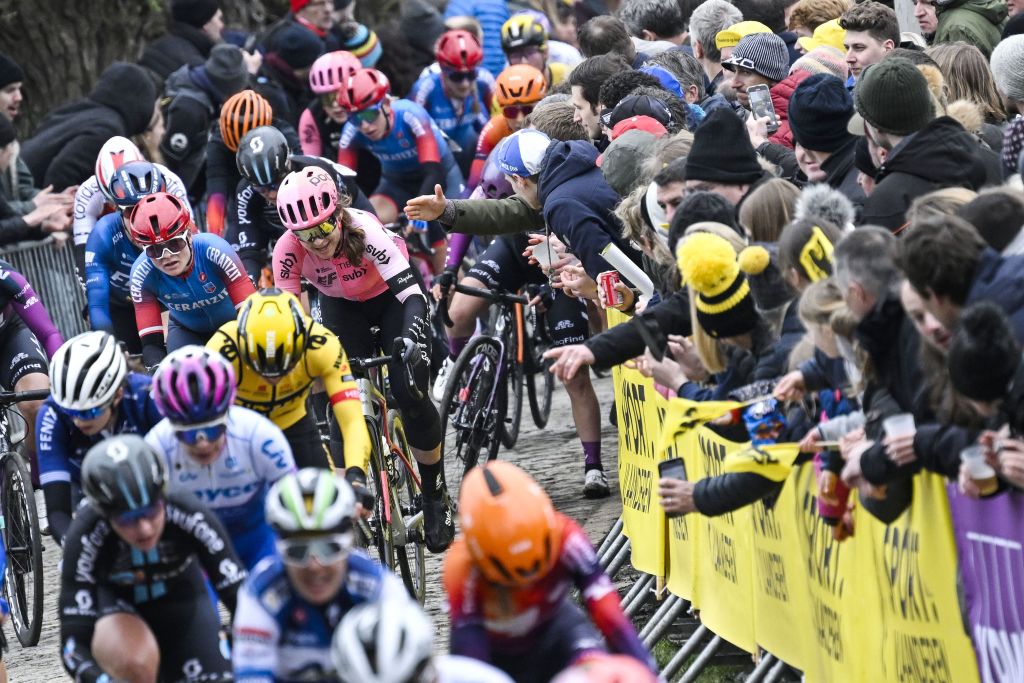
It all happened on the Koppenberg. The slippery surface caused riders at the front of the field to lose traction, and several were forced to stop and unclip, including Liane Lippert (Movistar) and Lotte Kopecky (SD Worx).
A chain reaction all the way down the peloton saw a blockage on the steepest part of the climb itself. Only Marlen Reusser (SD Worx) and Silvia Persico (UAE Team ADQ) could pedal all the way to the top.
Kopecky and her teammate Lorena Wiebes quickly remounted and caught back up to Reusser and Persico, and then a decisive chase group formed behind, but it was this point of the race that played one of the biggest roles in the outcome of this Tour of Flanders.
The Koppenberg was only recently added to the women's race, and the peloton is divided on how much of an impact it has on the event, especially considering that it is located at 44.6km to go when the field is typically still intact.
Barring accidents and mishaps, the two most decisive ascents are still the back-to-back late-race ascents over the Oude Kwaremont and the Paterberg, but in this edition of the Tour of Flanders, the race was first lost on the Koppenberg.
Wout van Aert and Jumbo-Visma’s unfinished symphony
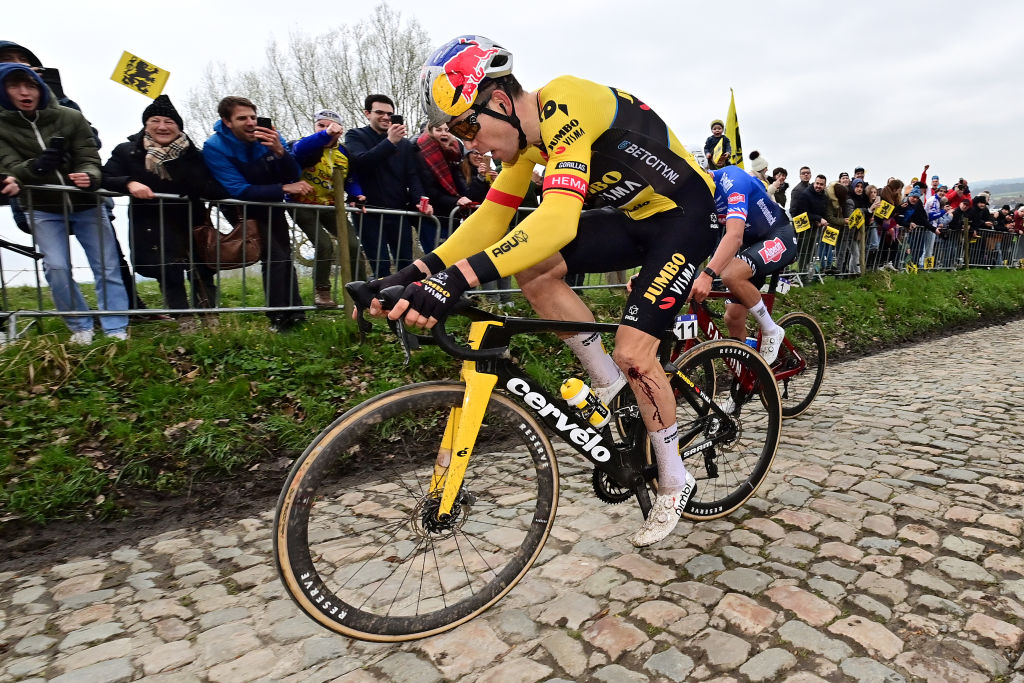
His 2018 debut apart, when he placed 9th while still nominally a cyclocross racer, Wout van Aert has known more heartbreak than happiness at the Tour of Flanders. Fourth place here was simply more of the same medicine. The prize he covets above all others, a race in his own backyard and seemingly tailored to his strengths, has remained stubbornly beyond his reach even as he has extended his range to shine everywhere else, from bunch sprints to time trials to the toughest mountain stages.
Van Aert is, by any metric, one of the best cyclists in the world. At last year’s Tour de France, for instance, he produced one of the most startling bodies of work the race had ever seen across its three weeks. Few winners in the race’s history can have owed as much to one teammate as Jonas Vingegaard did to Van Aert.
And yet on his own terrain, Van Aert still has much to prove, despite his protestations to the contrary after his E3 Harelbeke victory last week. His running tally of a single Monument victory – Milan-San Remo in 2020 – felt like an anomaly before the season began, but now it’s beginning to turn into an albatross, not least because Van der Poel has three and Pogacar already has four.
Van Aert warmed up for this Ronde by gifting Gent-Wevelgem victory to teammate Christophe Laporte, and the strength of his Jumbo-Visma team – winners of five cobbled Classics already this year – led many to give him the edge ahead of Pogacar and Van der Poel beforehand. Instead, Van Aert was the first of the Big Three to tap out, distanced on the Kruisberg with 26km to go, while his Jumbo-Visma team – billed as the heirs to QuickStep beforehand – left no real impression on the race.
They may be a relatively modern construct, but the Monuments outweigh everything else in the Spring these days. Van Aert and Jumbo-Visma’s previous dominance on the cobbles this year risks being dismissed unless they can snare one before April is out. The stakes could scarcely be higher for Paris-Roubaix. Despite everything they’ve done so far this year, Van Aert and his team still have it all to prove.
'Don't give up' - Breaking the SD Work stronghold
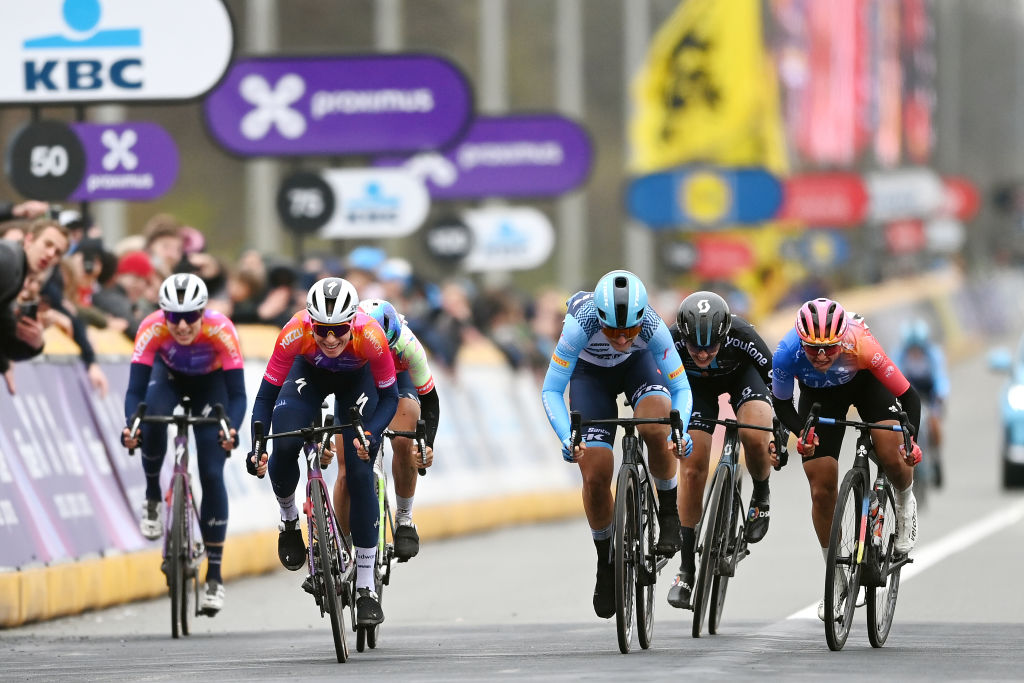
SD Worx has dominated this spring classics season with their strength in numbers and versatility, often finishing 1-2 on the podiums. Leading many to ask the question, can they be beaten?
Elisa Longo Borghini says, 'yes'.
There is no denying that SD Worx is hard to beat, but two riders have shown this season that it is possible; Shirin van Anjooij (Trek-Segafredo) at the Trofeo Alfredo Binda and Pfeiffer Georgi (Team DSM) at Classic-Brugge De Panne.
Even though SD Worx have their strongest roster at the cobbled classics, and the odds have been in their favour with numbers in the finals, these races are also the most unpredictable on the calendar. When rival teams race tactically and aggressively and take every opportunity to contest for podium positions, it is possible to beat SD Worx.
The best example of this was at the Classic Brugge-De Panne, where race-favourite Wiebes was isolated in the breakaway, and Team DSM played a perfect tactical game between Megan Jastrab and Georgi to take the win.
At the Tour of Flanders, Kopecky was certainly the strongest on the day, and SD Worx had the numbers with Vollering and Reusser in the chase. But riders like Silvia Persico (UAE Team ADQ), who stuck with Kopecky until she was distanced on the Oude Kwaremont, along with Kasia Niewiadoma (Canyon-SRAM), Juliette Labous (Team DSM), Anna Henderson (Jumbo-Visma) and Trek-Segafredo duo Elisa Longo Borghini and Van Anrooij were all among the late-race chase.
Longo Borghini finished third place and questioned whether teams sometimes give up when they see SD Worx riders up the road. She also encouraged teams to try their best to break the SD Worx stronghold on the peloton.
"At some point, you just don't have to always think about these SD Worx that are around - otherwise, you just lose the race. I've been watching a lot of television lately, and it seems like every time they are in front, the entire peloton is like, 'OK, SD Worx is in front, so they have won the race'. I'm like, 'NO!'
"We have to do our race. We don't have to give a heck if they are back there in the second peloton [blocking]; we do our race, we stick to our plan, we try to get back the first ones, and we try to win the race."
Soudal-QuickStep can still salvage something from the Spring
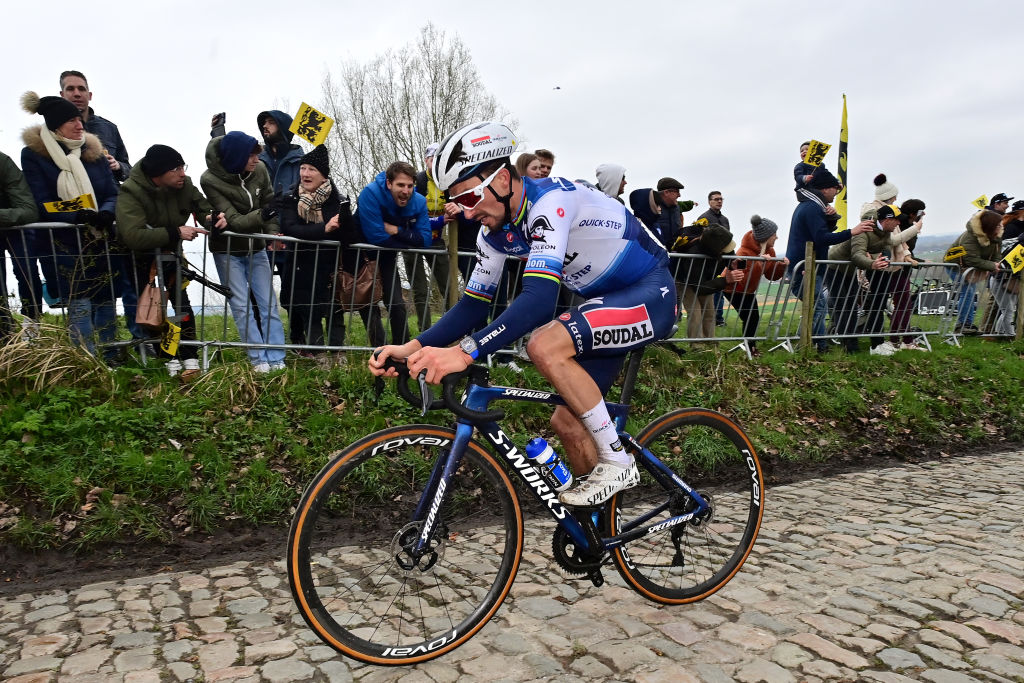
Kasper Asgreen placed second on his Tour of Flanders debut in 2019 and then won the race two years later. At first glance, his 7th place finish on Sunday reads like a disappointment, but the context changes its meaning. After finishing his 2022 season early with fatigue syndrome, the Dane had looked a shadow of himself through the early months of this year. His performance here, driving a crucial break from 100km to go, and then hanging tough in the chasing group behind Tadej Pogačar and Mathieu van der Poel, gives him an important foothold as he looks to climb back to his past level.
It also offers a flickering sign of hope for Soudal-QuickStep amid the most nondescript cobbled Classics campaign of the team’s long history. Even the previous nadir of 2011 was still decorated with a Tom Boonen win at Gent-Wevelgem. In 2023, by contrast, Patrick Lefevere’s team had been almost anonymous on the cobbles in a campaign dominated by ‘those yellows’ at Jumbo-Visma.
Asgreen’s enterprising attempt to outflank the Big Three on Sunday – at one point, his ten-man group had three minutes in hand – finally brought Soudal-QuickStep back to relevance in a cobbled Classic. “We really believed that that group would stay ahead,” directeur sportif Tom Steels said. “All the teams were individually represented. Only the Pogačar phenomenon could close the gap.”
In reality, Steels knows that Pogačar wasn’t the only rider who was operating several levels above his charges on Sunday. Even if Asgreen’s break had stayed away, it’s doubtful he would have overcome Mads Pedersen, Neilson Powless et al. Collectively, Soudal-QuickStep still aren’t adding up to the sum of their parts, and they remain some way down the pecking order ahead of Paris-Roubaix, far behind Van der Poel, Van Aert, Filippo Ganna and Stefan Küng.
Asgreen’s effort in Flanders, however, gives them reason to try more of the same at the most chaotic and unpredictable Classic of them all. Failing that, of course, they also have one Remco Evenepoel waiting in the wings for a joust with Pogačar at Liège-Bastogne-Liège. The Spring is still long.
Disappointment for Van Vleuten
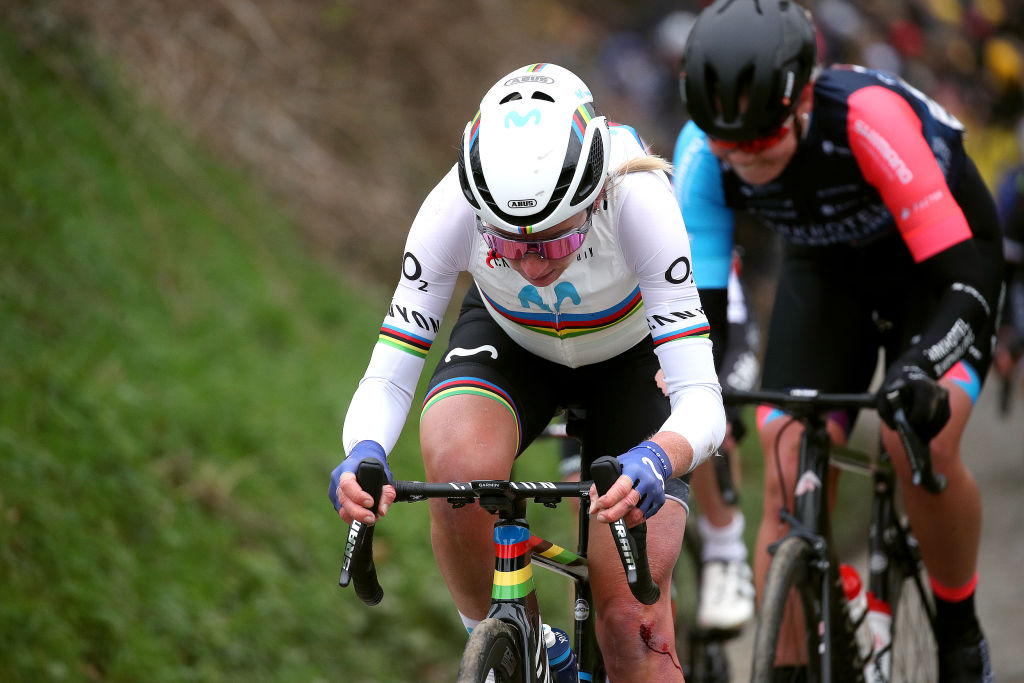
There were high expectations for Annemiek van Vleuten as she entered her final season before officially retiring from pro cycling at the end of 2023. Although the reigning World Champion has not won a race yet this season, many asked whether she could win a record-third title at the Tour of Flanders.
She has a primary focus on defending her titles at the Giro d'Italia Donne and Tour de France Femmes in July, but with a love for the Spring Classics, she made a point of racing Omloop Het Nieuwsblad and Strade Bianche with the Tour of Flanders her final cobbled classic of the season, and her career.
She came into the race fresh off of a training camp at Mount Teide in Tenerife and was one of the favourites. Had she achieved the win, she would have been the first woman ever to have won the Tour of Flanders three times, but it wasn't meant to be.
Her rear wheel slipped into the gutter, and she crashed, and although she got back up, she was forced to chase up the Koppenberg, effectively ending any chances of winning her final Tour of Flanders.
The good news is that she was not injured and will have more opportunities while racing the full Ardennes Classics - Amstel Gold Race, Flèche Wallonne and Liège-Bastogne-Liège.
Powless and Jorgenson’s roads less travelled
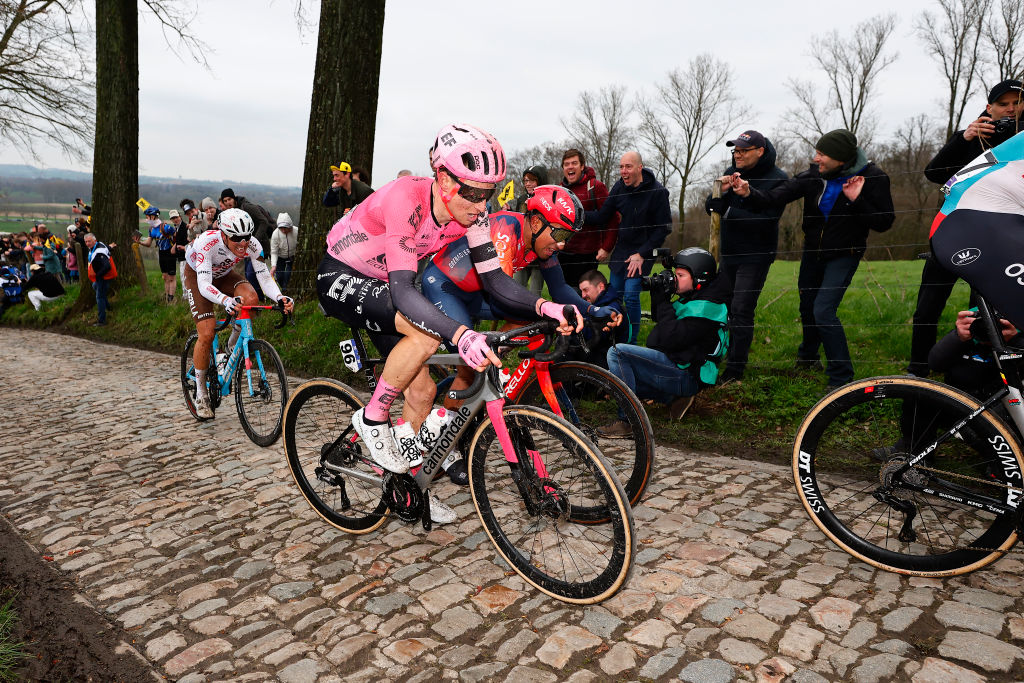
Neilson Powless and Sepp Kuss both turned professional with Jumbo-Visma in 2018, and in the beginning, it was maybe only natural to group the two Americans together. They were two articulate young men with an aptitude for climbing and they looked destined to progress quickly as Grand Tour riders.
When the older Kuss emerged as one of the peloton’s outstanding climbing talents, he was swiftly installed as Primoz Roglic’s key mountain helper with an eye to later exploration of his own GC ambitions. It was easy to assume that a similar fate awaited Powless at Jumbo-Visma, but instead his career broke off in several directions at once when he left for EF at the start of 2020.
Rather than limit himself to the role of climber, Powless now began popping up in the most unexpected places, winning the Clásica San Sebastian in 2021 and taking fifth at the Leuven Worlds. In 2022, he was in the mix at Liège-Bastogne-Liège, fourth at the Tour de Suisse and then one of the outstanding performers when the Tour de France visited the cobbles at Arenberg.
In 2023, Powless has won Étoile de Bessèges, climbed strongly in Paris-Nice and placed seventh at Milan-San Remo. Over the past week, meanwhile, he has added the cobbled Classics to his bow. After third place at Dwars door Vlaanderen on Wednesday, he proceeded to take fifth at the Tour of Flanders, despite two crashes and after going on the attack with 100km to go.
His displays echoed those of his compatriot and fellow Tour of Flanders debutant Matteo Jorgenson (Movistar), ninth on Sunday after taking fourth at the E3 Saxo Classic the previous week. Jorgenson, too, has shone on a variety of terrain in 2023. He warmed up for the Classics by winning the Tour of Oman and placing eighth in a most combative Paris-Nice.
On the evidence of the last week, Jorgenson and Powless clearly have a future amid the cobbles and hills of the Flemish Ardennes. But above all, their willingness to take themselves out of their comfort zones has brought them to some very interesting places – and they still have plenty more roads to explore.
Record viewers
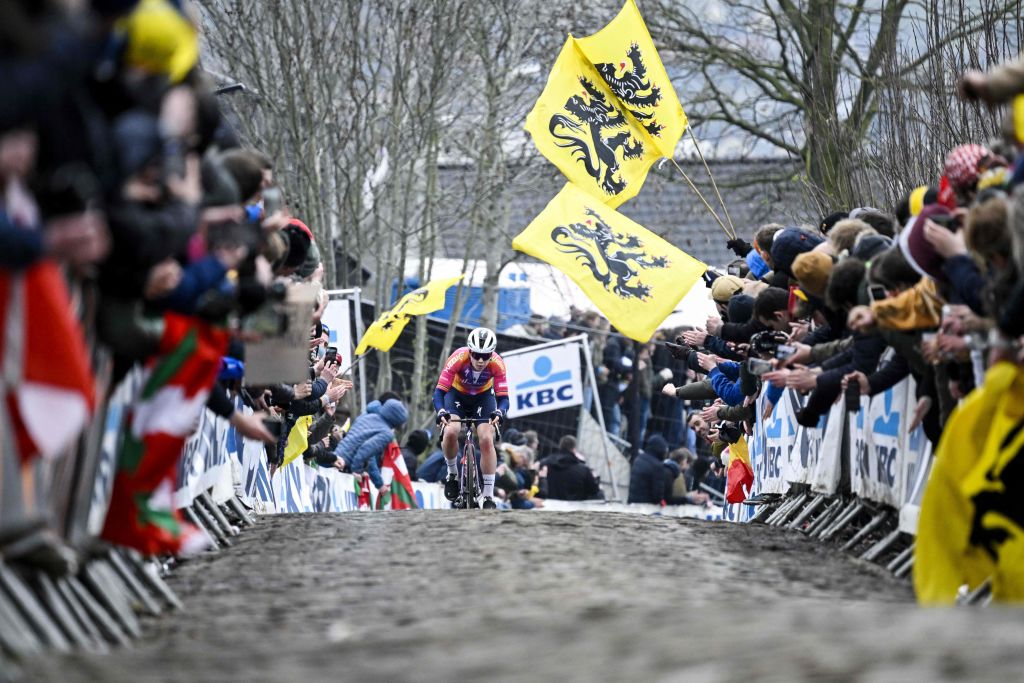
“I think I was deaf when I got up the Kwaremont. It was a lot of people cheering, that was very nice,” women's race winner Lotte Kopecky thanked the spectators for the extra motivation during the Tour of Flanders.
The fans were out in full force for both the women's and men's events, lining the iconic climbs of the Koppenberg, Oude Kwaremont and Paterberg and along the run-in to the finish line in Oudenaarde where Kopecky on the women's title and Tadej Pogačar won the men's title.
The at-home viewers we equally as impressive as record viewers tuned in to watch the women's and men's races on television and live broadcast in Belgium.
According to reporter Jonas Creteur, average viewers for the men's race reached 1.3 million, while the average viewers for the women's race hit just over 1 million.
Both events reached record viewers, with the women's event showing an increase of more than 265,000 compared to the previous year.
A large part of this success can be attributed to organiser Flanders Classics plan called Closing the Gap, which aimed to bring visibility and equality across all six women's and men's Spring Classics; Omloop Het Nieuwsblad, Gent-Wevelgem, Dwars door Vlaanderen, Tour of Flanders, Scheldeprijs and Brabantse Pijl.
The three main areas of focus were live TV coverage by improving the broadcasting times for the women's races to finish after the men's in prime time, classification on the international calendar and prize money.
📈 1.370.293 viewers (average) in Flanders for the men's edition of #RVV2023📈 1.030.099 @Sporza viewers (average) for the women's edition of #RVV23👉Both are new RECORDS for @RondeVlaanderen (was 1.304.477 & 764.268).BTW: that's +265.831 for 2nd victory of @LotteKopeckyApril 3, 2023







